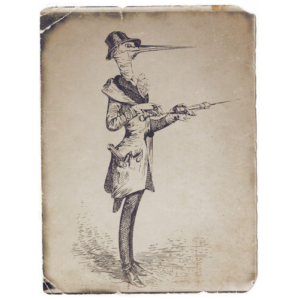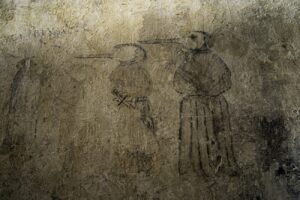Are you tired of wearing a cloth mask that resembles a face diaper that does nothing to filter the air?
There are other mask models to consider that have stood the test of time, and may help you stand out in a crowd, instead of blending into it.

With bird mask and hat. Vintage style. Biohazard concept.
One such model is the Bird Beak Mask. Since the 16th century, this menacing-looking mask has been a fashion statement of Plague Doctors who used it to filter their air stream while treating victims of plague and burying the dead. However, to everyone else, the beaked mask and coverings were a sign of death, the Grim Reaper in the flesh.
Who Were The Plague Doctors?
The Plague Doctors were the well-educated, well-connected, well-known and wealthy men from rich families, even if they were terrible healers. The sole purpose of the Plague doctor was to treat plague patients, even if the cause was as elusive as the cure. History tells a story that plague victims’ bodies piled up quickly, were carted away, and unceremoniously dumped into mass graves. Hundreds were burned at a time. Entire villages simply ceased to exist.
The plague doctors’ duties were far more actuarial than medical. Most did a lot more counting than curing, keeping track of the number of casualties and recorded the deaths in log books.
These doctors were not allowed to mingle with the general public (much like the political and Hollywood elite, today), and were said to self-quarantine for long periods of time after treating patients. History writes of Plague Doctors living lonely lives in isolation, but who really knows, since many of them just up and disappeared after the plagues, never to be heard from again.
Plague doctors were sometimes requested to take part in autopsies, and were often called upon to testify and witness wills and other important documents for the dead and dying. Not surprisingly, many a dishonest doc took advantage of bereaved families, holding out false hope for cures and charging extra fees (even though they were supposed to be paid by the government and not their patients). – Doctorsreview.com
Before or by the 17th century, three dominant Theories of Disease Transmission were accepted:
1) By Miasma Theory, or “bad air”
2) By divine mandate through the Will of God, or by the Planets or Comets
3) By some unknown device jumping from person to person.
The Costume
 To ward off miasma, and other possible transmitters of disease, the Plague Doctors’ costume was developed to look like a featherless, black “Big Bird.” The six-inch beak area over the nose also came with round eye openings and a black wide-brimmed Morocco leather hat that indicated the profession of doctor.
To ward off miasma, and other possible transmitters of disease, the Plague Doctors’ costume was developed to look like a featherless, black “Big Bird.” The six-inch beak area over the nose also came with round eye openings and a black wide-brimmed Morocco leather hat that indicated the profession of doctor.
The beak functioned as a respirator and contained herbs, such as wormwood, spices, dried flowers, camphor, and a vinegar sponge that protected against miasma or “bad air.” The shape of the beak is said to have slowed the passage if air before being absorbed by the herbs and traveling to nostrils and lungs. The full-length impermeable coat was made from waxen leather. The hands were gloved. And the canes were used to examine victims without touching them.
Building on the theory of miasma, some plague doctors in France set the scented material inside their masks on fire in the hopes that the smoke would help to clear the bad air. – Doctorsreview.com
In fact, the costume of the 16th century was dusted off and reused in the 17th and 18th centuries, since plagues seemed to appear every 100 years, like clockwork. Each plague came with a narrative of “the most feared disease in the world, capable of wiping out hundreds of millions of people in seemingly unstoppable global pandemics.” Sound familiar?
Unfortunately, with each plague, the Plague Doctors were never able to prevent or cure the plague. No matter how certain the Plague Doctors believed in their treatments and “cures,” they universally failed. Could the poor outcomes have been due to the treatments?
The Treatments
 These were the times of blood letting, where Plague Doctors bled a vein to release “bad blood” or “hot blood.” Sometimes vinegar, arsenic and mercury were fed to infected individuals. Food might be rubbed on the patient’s body, including onion, herbs, pigeon, or snake, dead of course. Sometimes doctors would burst an inflamed lymph node in the neck, groin, or armpits.
These were the times of blood letting, where Plague Doctors bled a vein to release “bad blood” or “hot blood.” Sometimes vinegar, arsenic and mercury were fed to infected individuals. Food might be rubbed on the patient’s body, including onion, herbs, pigeon, or snake, dead of course. Sometimes doctors would burst an inflamed lymph node in the neck, groin, or armpits.
Doctors tried to purge a fever by sitting a patient close to a fire, and there was always the option of smothering patients in their own feces, or dropping them off in the sewer overnight if they couldn’t produce enough of their own waste. Patients were told that the plague was punishment from God. And it was reported that some devout patients asked to be beaten into repentance with the doctor’s cane or a whip. But that may just be a story.
According to Historian, Winston Black, the Plague Doctors did not have clients. “Instead, they went around the city during a plague outbreak, making decisions about which houses to lock up or condemn, which neighborhoods to quarantine, and so on.”
The beak doctors, as they came to be know, dropped like flies or pretty much lived under constant quarantine, wandering the countryside and city streets like pariahs… until of course desperate families needed them.
During the Middle Ages, there were alternative treatments. Botanists were known as herbalists; they collected, grew, dried, stored, and sketched plants. Many herbalists became experts in identifying and describing plants according to their morphology and habitats, as well as their uses. The best medieval treatment that healed was a salve made of onion, garlic, wine, and cow bile that has shown promise 1000 years later against today’s “modern” Superbugs. This salve can kill 90 percent of the methicillin-resistant staphylococcus aureus (MRSA) bacteria cultures.
MRSA is a serious public health concern; it is a difficult infection to treat, as it has naturally developed resistance to modern antibiotics, and has thus been given the classification of “superbug.”
The Middle Ages were Dark Ages for other reasons. Between 1450 and 1750, thousands of herbalists became victims, themselves, allegedly ‘burned at the stake’ for their healing work. But, were victims of the plagues victims of parasites?
Worms and Parasites
Whenever the body’s immune system is depressed or suppressed due to toxic exposures, including radiation or harmful frequencies, and malnutrition, that is a proven recipe for pathogenic microbes and parasites to move in.
 Ancient Rome was known to fertilize crops with human feces, which may have provided a vector for parasitic infections in the early documented plagues. Likewise, eating raw fish and unfermented fish sauce was another opportunity for tapeworm infestation in ancient Rome, especially if people were exposed to other toxins.
Ancient Rome was known to fertilize crops with human feces, which may have provided a vector for parasitic infections in the early documented plagues. Likewise, eating raw fish and unfermented fish sauce was another opportunity for tapeworm infestation in ancient Rome, especially if people were exposed to other toxins.
Research in the 2016 Journal Parasitology, from the University of Cambridge, shows that Romans experienced parasites as whipworm, roundworm, and a fish tapeworm. Even with sanitation, they suffered from ecto-parasites such as fleas, lice, and bedbugs at the same rate as Vikings and Medieval Europeans.
What about exposures not recorded or lost vital records? Or altered records describing toxins from water or air? What about new frequencies unleashed during plague-ridden times that mimic flu symptoms in the body?
Today, people are faced with toxic exposures, radiation, and particle dust (PM 2.5) that enters the blood and lungs to create chronic lung diseases. Harmful frequencies and malnutrition are also hazardous to health and often ignored by health authorities. These exposures all change the pH of the body’s tissues to draw in pathogens and could be main reasons why most people harbor parasites today.
Under the “COVID” scare, the National Institutes of Health promotes the anti-parasitic animal, drug “Ivermectin,” without using the term parasites. While this drug may work for some people, similar to another anti-parasitic FDA-approved, non-toxic drug, Fenbendazole, it does not work for everyone. The presence of parasites represents a warning that the body’s immune system is breaking down. In fact, most if not all cancers represent parasite infestation, even if the presence of parasites does not always indicate cancer. Parasites in humans also reflect parasitic human relationships. And there are plenty of those, from friendships and marriages, to relationships between doctors and patients, and between people and elected (or non-elected) officials.
When parasites overwhelm the body it is called hyperinfection. The symptoms of parasites include chronic cough, fever, chills, chest pain, and fatigue, symptoms similar to flu. From the 16th century to the 21st century, if medical doctors have not improved their success rates over diseases, it may be due to lack of knowledge.
Most doctors diagnose disease without testing for parasites. Why not test when there are multiple ways parasites take up residence in the body? One reason is the price tag for an antiparasitic prescription, which can reach over $8000 for fourteen 200-mg tablets of prescription Albendazole, once the insurance companies get involved. According to Goodrx.com, 4 tablets of Albendozole cost approximately $115.00 if you purchase them yourself. Surgery is also more profitable, at over $100,000, than prescribing antiparasitic tablets. 
Doctors continue to choose dangerous prescription medications such as the FDA-approved drug Veklury (remdesivir), as well as harmful procedures (ventilation), that can cause death. New antiviral medications for COVID come with adverse health risks. Neurotoxins, aluminum and mercury (Thimerosal) are still found in some injections, called vaccines, “to safeguard against contamination,” believe it or not.
M.J. Fahey describes the extent of human parasites here. She refers to biophysicist and naturopath, Dr. Hulda Clark (1926-2009), provided a recipe for making Lugol’s solution in her 1995 book, “The Cure for All Diseases.” In her book, she tells readers to ask pharmacists to make Lugol’s Solution. At the time her book was published, a pint of Lugol’s Solution, sold in brown glass bottles, cost about $20. Lugol’s popularity among physicians of the 19th Century is reflected in the poem:
If ye don’t know where, what and why,
prescribe ye then K and I
The atomic symbols, K and I, are symbols for potassium and iodine. Farmers can still purchase iodine crystals if the DEA can verify the location of their farm with a satellite photo. The DEA also allows the sale of a 2% Lugol’s Solution, since the 5% dilution is banned.
If simple solutions to health exist, why, then, are are doctors still failing to create health or avert the diseases that plague populations?
The Plague Makers
 Running silently alongside the Plague Doctors, the publicized disease plagues that build fear of communicable diseases, and death tolls, are the unseen Plague Makers.
Running silently alongside the Plague Doctors, the publicized disease plagues that build fear of communicable diseases, and death tolls, are the unseen Plague Makers.
From The Bubonic Plague of 549 to the Black Death of 1348 to the Cholera and Typhoid scares of the 1890s [and the promotion of the Germ Theory], to the 1918 Spanish Flu, there have been dozens of so-called plague infestations. See an “approved” historical timeline of some plagues and epidemics. Read about the coincidental timeline of electricity in The Invisible Rainbow.
Each new plague and pandemic was accompanied by a hidden more sinister plague of new restrictions on the rights of the people under “quarantine authority.” Government quarantines began in the 19th century.
Among such restrictions include The National Quarantine Act of 1893 and the 1902 Pan American Sanitary Bureau, the first of a series of international health organizations formed in the 20th century—culminating with the World Health Organization in 1948—that helped to bring issues of quarantine and the control of disease to a global stage. There was the 1944 Public Service Act and the 2001 Patriot Act after September 11 terrorist attacks, and many Acts in between.
All the world’s a stage,
And all the men and women merely players;
They have their exits and their entrances;
And one man in his time plays many parts. – William Shakespeare, As You Like It
The common denominator among all plagues was not only the alleged “germ,” or the fear, or the advertised death toll, but it was also the consequences of an ignorant population that allowed “authorities” to tell the stories that removed innate freedoms. Biohazards that began illness and disease could just as well have originated from contaminated air, or new frequencies, or both.
History repeats itself if unchecked. And we, as humans, repeat the same events under new names perpetually, over and over again, if unconscious. Mass extinctions of people and freedoms happen simultaneously, through wars and plagues. Each time they happen, it is through ignorance, because people choose to become victims over and over again.
Did the Plague Doctors disappear without a trace, or did they assume a different title, with different tools, and a new costume? Is it time to recycle the herb-filled beak mask as an air purifier for anyone who wants a functional mask during the latest plague known as COVID?
Related Articles:








Interesting. Thanks for that.
Same stuff different day it seems with these so called doctors.
Could they be getting ready to dial back the so called pandemic? Seems like it , at least here where I am. CDC coming out and changing up “rules” and “procedures “ all the sudden.
It seems like depop is not the only or main goal with the shots, in my opinion, as “they” don’t need to administer shots in order to get rid of large numbers of people. In the air and other places that “they” already operate seems more appropriate, but I could be wrong- it wouldn’t be the first time.
These masks these “doctors “ used to wear are kind of a trip. Seems like they’re always trying to instill fear in every way possible.
I agree, Allan. They appear to be dialing back the mandates because the next steps may have to do with currency and a new monetary system.
Keep ’em guessing seems to be the motto.
But the air has always been a vector of dis-ease, right? Whatever is under the Public Health “Acts” including food, water, drugs, etc, is up for grabs.
Creepy! That the ‘stork’ that brings life so much resembles the Plague Doctor gear is really creepy!
That six inch bird peak which the Plague Doctors wore might be too tight for me, as I have a big nose, plus it looks to confining and I’m claustrophobic, but at least maybe the terrified ones might feel more secure and safe from the new, perpetual virus wearing the new Covid -costume.
Ha! There’s no way some of my family members could fit into the six inch beak due to nose size as well. Maybe six foot beak.